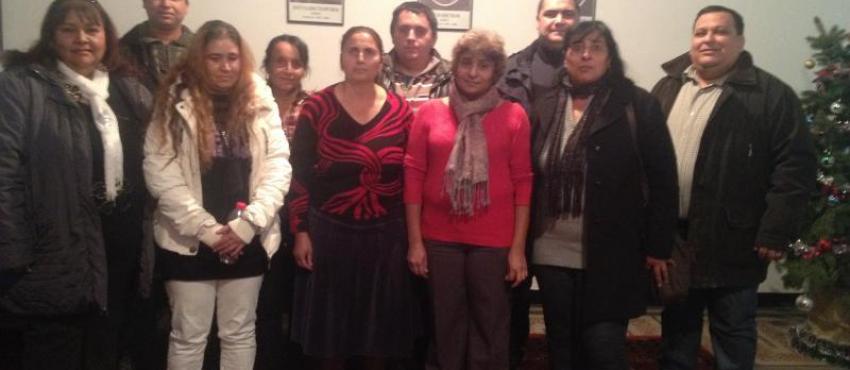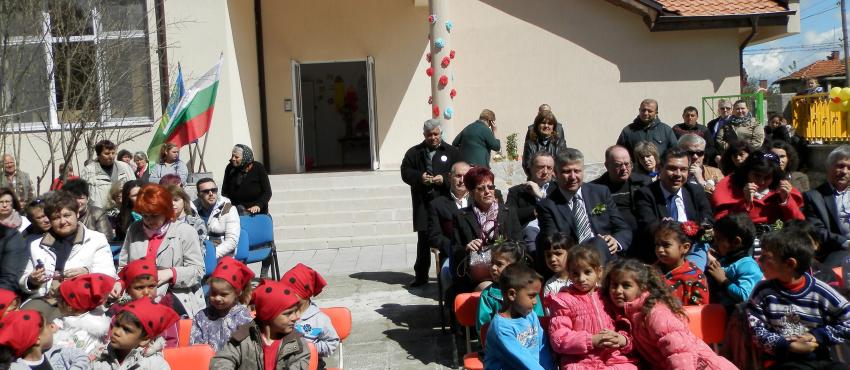Tundja
*Disclaimer: The information and views set out in this page do not necessarily reflect the official opinion of the Council of Europe and/or the European Commission. Neither the Council of Europe, the European Commission nor any person acting on their behalf may be held responsible for the use which may be made of the information contained therein.
The municipality of Tundja ( Тунджа ) is located in the Yambol region in the South-East of Bulgaria. It is the administrative centre for 44 villages with a total population of about 25.000 inhabitants, out of which 15 - 20% are Roma.
Although the Roma population is spread throughout the villages of Tundzha, the highest concentration of Roma are in Zavoy (Завой), Boyadzhik (Бояджик), Krumovo (Крумово), Kukorevo (Кукорево), Drazhevo (Дражево), Hadzhi Dimitrovo (Хаджи Димитрово) and Botevo (Ботево). In these villages, the Roma population makes up between 30-50% of the total population.
As with most rural areas in Bulgaria, the residents of this municipality face economic deprivation. Opportunities for employment are provided by larger companies that mainly are in the textile industry; wineries; and furniture manufacturers in the town of Yambol.
The unemployment rate among Roma is estimated to be between 15%-20%, with the overall unemployment rate of the municipality standing at roughly 10% of the total population. Employed Roma living in the surrounding villages are mostly employed in these larger companies and these groups have access to transport into the town. Some of the Roma families have farming as their main source of income. Women are generally represented at higher rates than men and it is worth noting that in the past few years Tundja Roma have also experienced higher migration numbers where an increasing number are leaving to live and work in Western European countries, mainly Germany and Belgium. Many of the Roma in this community choose to work abroad to find work to financially support their extended families.
Local Roma populations in the Tundja municipality have the support of the local administration who are committed to support Roma inclusion into wider society through a variety of actions. In 2016 Tundja was recognised by the European Commission for their example of good practices in Roma integration, the Tundja municipality was recognised for the empowerment and cooperation of communities through Local Action Groups (page 33 of the "Effective Roma integration measures in the Member States 2016"publication of the EC).
In 2007 the municipality adopted a general local development strategy which included specific measures targeting the Roma population. One of the primary areas of investment has been in education and early childhood education policies. Educations activities have included actions to encourage Roma children’s attendance in school and kindergarten which were taken in line with new national legislation for compulsory pre-school attendance. The municipality has waived kindergarten fees for Roma families in 2010 and has also organised a number of extracurricular/non-formal education activities for children. The municipality has also partnered with local viticulture businesses to invest in viticulture vocational training for young adults. Experts from partner companies train young people in a general secondary education facility in the skills needed for wine production, the majority of the programme’s young people are Roma. In 2014, 20 of the 23 viticulture programme students were Roma. Other projects targeting Roma community children’s attendance in primary education have been delivered in the municipality with co-financing from the Ministry of Education and the European Social Fund.
A key ingredient for success in the municipal Roma inclusion strategy has been the historical self-organisation of the Roma community through the “Patients with no Asthma” Roma NGO has been working since 2004 with mothers and families in the villages to increase health literacy and access to health care.
The ROMACT Process
The municipality joined the ROMACT programme in October 2013 after the confirmation of participation from the Mayor, Mr Georgi Georgiev. Immediately after the agreement was signed, the Community Action Group (CAG) began to meet to identify their development needs in four main categories: social infrastructure, education, health and employment. The group identified that the most acute problems for Roma communities are found in the villages of Hadzhi Dimitrovo and Mogila.
In May 2014, the municipality established a Public Council on Ethnic and Integration Issues, which was mandated to engage and consult with the CAG, this public council can be seen as a sign of recognition of on the importance of consulting with Roma communities in developing ethnic and integration policies. It must be noted that the work of the Council is not limited to formal gatherings – the administration and the CAG have ongoing intensive communication, mandatory monthly meetings and, when required, daily contact to address urgent issues as they present themselves.
Development needs identified by the municipality administration and the CAG were acknowledged by the Municipal Council and integrated in the Municipal Plan for Roma Integration (MAPRI) which was adopted on 10 March 2015.
In addition, the Annual Action Plan for 2015 was developed jointly by the CAG and representatives of the municipality.
| Priorities | Objective 1 | Objective 2 | Objective 3 | Objective 4 | Objective 5 |
|---|---|---|---|---|---|
| Education | Bilingual educational technologies of training for Roma children | Activities aimed at preserving and developing the cultural identity of Roma children | Waiving of kindergarten fees for nursery / kindergarten for poor Roma families | Appointments of qualified and certified assistants of teachers; | Organize individual mentoring assisting pupils |
| Health | Assistance from mediators to access various social and health services | Prophylactic examinations with mobile units in Roma neighbourhoods; | Prevention of unwanted and early pregnancy in a dialogue with teenagers and their parents | Awareness raising campaigns on vaccination | Support for the functioning of mobile medical offices for primary care in Roma neighbourhoods |
| Housing/Infrastructure | Assessment of the needs in Roma neighborhoods | Identification of suitable plots and construction of social housing for large Roma families | Construction of social housing - single family houses in the villages with significant Roma population | Elaboration of new detailed plans for villages with significant Roma population | Design of the technical infrastructure for villages with significant Roma population |
| Employment | Training courses for unemployed persons | Involvement of members of Roma community in projects and programs in the field of social economy under the OP HRD |
Reviewed at joint meetings at the end of 2015, the Annual Action Plan was updated by the CAG and the Local Authority for 2016 and further implemented as described below:
| Priorities | Measure implemented | Measure implemented | Measure implemented | Measure implemented | Measure implemented |
|---|---|---|---|---|---|
| Education | 560 children attended kindergarten for free | “School communities - a model for parent activities in small settlements” implemented in 8 schools | Construction and equipment of kindergarten in Hadji Dimitrovo for 47 children | "Support for pre-school education and training of disadvantaged children" (OP-SESG) | Free transportation service to school |
| Health | "Desired spaces - a complex model for integrated services for early childhood development and social inclusion in smaller locations" (OP-HRD) | ||||
| Housing/Infrastructure | Construction of a playground in Zavoy and Boyadzhik | Regulation of 23 construction plots in Zavoy | Street repair works, street lighting and asphalthing in 7 villages | Construction of a sewage system in Hadzi Dimitrovo | Construction of current water network in Boyadzhik |
| Employment | “Training and employment for young people” (OP-HRD) | Training and employement for 6 months of 54 persons up to 29 years old from 7 villages |
The CAG is recognized and acknowledged as a key stakeholder by the local institutions in the municipality. Some CAG members are part of the Council for cooperation on ethnic and integration issues. This Council is lead by the Mayor of Tundzha municipality and it consists members of the municipal administration, local councillors, police officer, health inspectorate expert, regional educational inspectorate expert, experts from the social and employment services, school and kindergarten principals and members of the CAG (Regulation of the Council and Activity Report 2019).
The CAG has regular meetings with relevant authorities and is involved in the implementation of measures not only for advocacy but also for data collection. In April 2016, the monitoring mechanism for the MAPRI was approved by the Local Council and includes CAG members. During the same month, the cooperation with the CAG was also reinforced with the inclusion of a CAG member in the Local Action Group for the development of a Local Development Strategy to be supported by CLLD under the EAFRD.
In addition to the above actions, the municipal staff have attended several ROMACT programme training and coaching sessions and staff and community have benefited from the support of the ROMACT Expert with regard to the application process for EU Funds. ROMACT process ended in May 2016 in Tundja.
The Municipality benefited of ROMACT expertise for the following projects :
The expertise provided by ROMACT for municipalities involves training and guidance on preparing project proposals and implementing inclusive policies aimed at improving the living conditions and social integration of vulnerable populations, including the Roma.
* OPHRD- OPSESG "COMPASS- Integrated measures for social inclusion in Municipality Tundja"
Budget : 455 016€
Status : approved
* BG05M2OP001-3.014-0004 "DIRECTIONS - Interactions in the school community for full integration, equal access to quality education and successful future realization of students from small settlements"
Budget : 66 556,00 €
Status : approved
* BG05M2OP001-3.014-0002- "School in Action".
Budget : 69 230,00 €
Status : approved
* BG05M2OP001-3.014-0001 "With hope for a better future”.
Budget : 102 562,00 €
Status : approved
* BG05M2OP001-3.014-0005 “New future for traditional professions in the digital era. Towards new professional horizons through humanitarian approach in the interactive classroom”.
Budget : 58 461,00 €
Status : approved
/ Building school STEM environment - National Program “Establishing school STEM environment”, Ministry of Education.
Budget : 28 205 €
Status : approved
Trainings provided by ROMACT experts :
Community Action Groups (CAG):
* Addressing drug delivery and use in the Roma neighbourhoods.
Local Authorities (LA):
* Participation in a public consultation of the Recovery and Resilience Plan of Bulgaria.
ROMACT Small Grants Scheme :
ROMACT offers small grants scheme to support the efforts of the municipalities and Community Action Groups to respond together to the needs of the most vulnerable and to multiply the good practices across ROMACT municipalities.
Under the scheme of small grants, the following project was supported by ROMACT during April - July 2020:
Initiative to counter COVID19 pandemic – Municipality of Tundzha
ROMACT supported the municipality with 2550 € reaching 1084 people within Roma community. The project covered information campaign on COVID19 and provided masks, disinfectant products, informative flyers to raise awareness in the community. The community action group worked closely with health mediators and social workers to implement the project.




